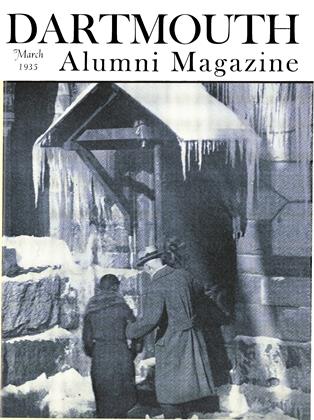No REPORT from the President's committee on the survey of social life in the College is expected for some weeks, or even months, to come. It is evident in Hanover that the group of 14 representatives of the alumni, faculty, administration, and student body is making every possible effort to gather a great variety and quantity of data before even beginning to discuss what may be the final recommendations to President Hopkins. A detailed questionnaire asking for both fact and opinion has already been filled out by all members of fraternities, another by men not affiliated with fraternities, and a third by fraternity advisors. Alumni will be consulted by the committee later in the year and freshmen will likewise be given an opportunuity to express their opinions in the course of the survey.
In view of some misapprehensions that seem to exist in regard to the social committee's work it should be stressed again . that the scope of its survey was defined by the President to be "the whole social fabric of the College." Because of the major role played by fraternities in Dartmouth social life it seems reasonable to expect that they will be subject to careful study by the committee, but so, doubtless, will all other social agencies and groups, such as eating clubs, restaurants, and Commons; the Nuggett and the Players; the Outing Club and other athletic and non-athletic organizations; dormitories; Carnival, house parties, and other dances; and other factors of significance in the situation. All of this is a monumental task. We are confident that the committee is going at its job with the paramount desire of being helpful, and not harmful, whether to the fraternity system, to the social problems of freshman year, to entertainment or eating conditions in Hanover, or whatever. And there likewise seems to be evidence that the undergraduates and others concerned are giving the committee excellent cooperation in the preliminary work of collecting data.
ASSUMING THE SOCIAL survey committee's desire to have first hand evidence of current social difficulties in Hanover, it should learn a lot from the Carnival festivities just past. During the holiday weekend the Outing Club's efficiency in running off a complicated outdoor program was widely and favorably commented upon. But the smoothness with which the purely social side of the program progressed leaves much to be desired. If the ever-increasing throng of visitors to Carnival is to continue to increase, what is going to happen? This year it was practically impossible to find an extra room or a bed in town; the overflow of visitors spread through the whole countryside; restaurants were so jammed that they could only admit a few patrons at a time and kept a line waiting in the street; a conservative estimate places the number of visiting collegians from other colleges at several hundred .... there is nothing gained in the way of furthering good intercollegiate relations when these visitors act as though they were attending the Mardi Gras in New Orleans .... nor is their example a particularly good one to the less fortunate men in College who do not have guests, who are roaming around looking for excitement, but who are subject to the discipline of authorities since they are on their own campus.
The effectiveness of student control of fraternity dances and of dormitory rules and regulations was severely tested at Carnival. It was a crucial time since student control had come into existence along with repeal and easy access to liquor in White River and Lebanon. Altogether, observers and authorities seem to unite in feeling that things went pretty well. It is too much to ask Palaeopitus to act in the capacity of policemen or college officers on these holiday occasions. Student control should become operative well before the parties begin, in making sure that careful planning and adequate preparations are made by both fraternities and dormitories to develop group spirit to such an extent that the parties will go off smoothly and without untoward incidents. It has been our experience that whenever there is careful planning and public opinion is guided and aroused, any occasion, whether social or otherwise, is pretty certain to be successful. Student control of undergraduate conduct should become proportionately more effective as its policing aspect is decreased and its advance planning element is increased.
Once again, and there is new evidence every week, it has been shown that Dartmouth's greatest need is a social center, or student union. Great public occasions, like Carnival, Commencement, and football week-ends, could become doubly pleasant were there a social center on the campus. And such a building would be a truly vital addition to the daily social life of the undergraduate body.
 View Full Issue
View Full Issue
More From This Issue
-
 Article
ArticleGraven Laycock: A Dartmouth Tradition
March 1935 By C. E. W. '30 -
 Article
ArticleHANOVER BROWSING
March 1935 By Herbert F. West '22 -
 Class Notes
Class NotesClass of 1914
March 1935 By C. Edward Leech -
 Class Notes
Class NotesClass of 1918
March 1935 By Allan C. Gottschaldt -
 Article
ArticleTwenty-Five Years Ago
March 1935 By Hap Hinman '10 -
 Class Notes
Class NotesClass of 1934
March 1935 By Martin J. Dwyer Jr.
Article
-
 Article
ArticleDean at Columbia
December 1953 -
 Article
ArticleVietnam Week.
JUNE 1967 -
 Article
ArticleUrban Study in Boston
MAY 1969 -
 Article
ArticleNovember Schedule
By CLIFF JORDAN '45 -
 Article
ArticleRhodes Scholar
February 1961 By D.E.O. -
 Article
ArticleDartmouth's Intellectual Life
MARCH 1929 By Professors Harry E. Burton, William Stuart Messer, And Royal C. Nemiah

